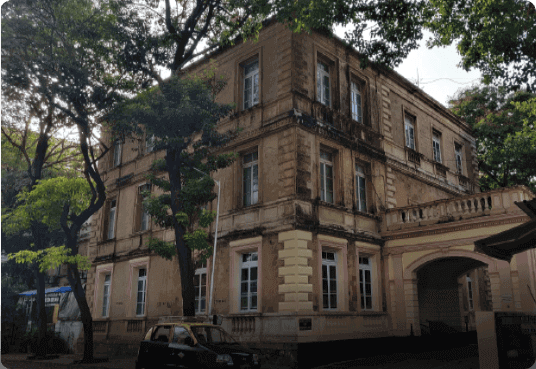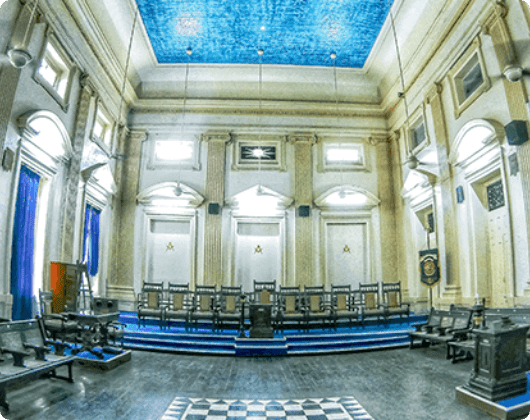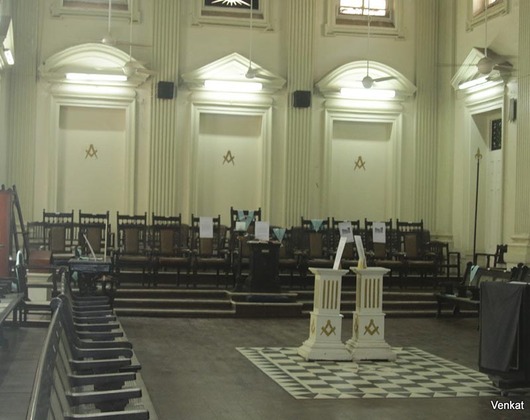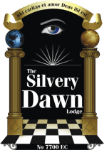
Lodge Light Of Asia No.7700EC was consecrated on 5th May 1960. The lodge grew in strength year after year and had regular meetings without a break. Around 1974-75, they brought up a very non-Masonic problem that affected their Masonic lives, the name of the Lodge. There was a barbershop a stone’s throw away from the Lodge premises with the same name, and there were also a few Irani tea shops sporting the same name in the vicinity. The brethren of the Lodge, desiring a more positive spin on the Lodge name, decided to change its name to Lodge Silvery Dawn No.7700EC. The United Grand Lodge of England approved it, and the new name was adopted, much to the pleasure of its brethren, in its regular meeting held on 1st May 1975.
However, the old logo and the banner persisted. Subsequently, the brethren felt it was time to change them both to reflect the essence of ‘Silvery Dawn’. A new logo and banner were adopted. The District Grand Lodge and the United Grand Lodge of England approved it. Quite fortuitously, the adoption of the banner coincided with the dates of the 150th year celebration of the District Grand Lodge of Mumbai. The brethren of the Lodge were genuinely delighted when they received the consent of the Deputy Grand Master and his delegation to dedicate the banner.


Freemasonry is an invisible but palpable glue that binds men of trustworthy moral character and majestic incorruptible principles and ideals worldwide. It is the world's largest fraternity but, over the centuries, has kept a profile so low as to remain relatively unknown to the populace at large.
Since it does not actively solicit membership, it has probably unfairly earned the grossly misleading epithet of being a secret society, which, it must be emphasised, is far from the truth.
Know More
Freemasons came to India during the British Rule. It was brought here by the English, the Scottish and the Irish, who established their Lodges in India with their own set of rules, rituals and practices, which they called "Constitutions".
Membership to lodges was restricted only to expatriates, but over time all three Constitutions conferred membership to Indians as well, first to Royalty and Nobility and later to the laity.
The Masonic operations in India were divided into four districts, i.e. Bengal, Madras, Mumbai and Northern India. Each district has affiliated with several Lodges in various locations throughout its geographical limits. The districts are autonomous, although they share a close relationship with the two other Constitutions.
The initiation for the first Lodge to admit Indians into Freemasonry took place at the Town Hall in Mumbai, now called the Asiatic Society.
All four districts of Freemasonry in India have their respective District Grand Masters, their Boards of Governance, their own set of by-laws and their charity programs. Reciprocal inter-District and inter- Constitution visitations to one another’s events are a regular feature of Freemasonry in India. They help keep fraternal relations warm and the fraternity alive.
The grand principles on which the order of freemasonry is established are Brotherly love, Relief and Truth. The focus of Relief is realised by imbibing in each Mason the noble virtue of charity at his initiation. Over the years, the District Grand Lodge in Mumbai has established several charities, notably the District Board of Benevolence, and the Mumbai District EC Grand Charity, with a sister body, the Mumbai Masonic Association.
Each targeted a particular aspect of assistance and a specific class of beneficiaries. In January 2017, the District celebrated the Tercentenary (300 years) of Grand Lodge by establishing a fourth charity, the Mumbai (Bombay) Masonic Benevolent Fund (BMBF). Inaugurated by Deputy Grand Master RW Bro Jonathan Spence himself, it aims to merge the activities of the previous charities into one organisation.
The initiative to join must come from you. You will have to step forward to communicate your intention to join the fraternity. Since, as mentioned earlier, Masonry does not actively solicit membership. It will not approach you with an offer or invitation to join.
Your religion, or whether you practice one, is of no consequence to Masonry. What matters is that you must believe in the existence of a Supreme Being and complete 18 years of age. There will be a selection process where all existing members feel that the candidate is fit to be a Mason.
Check out more information about How to join Freemasonry?
